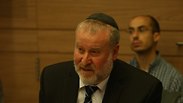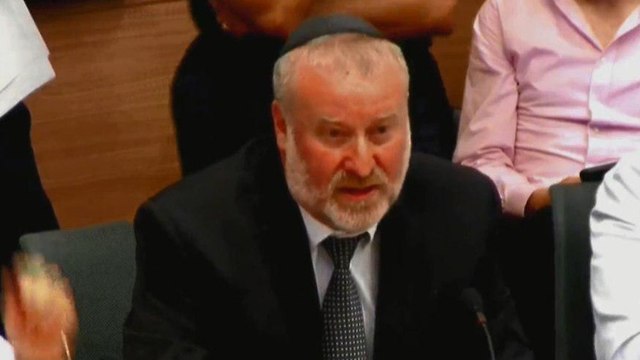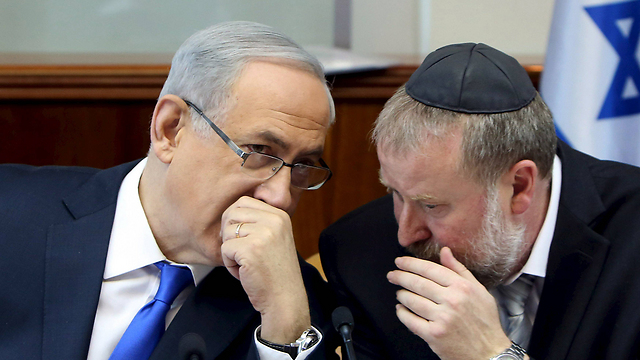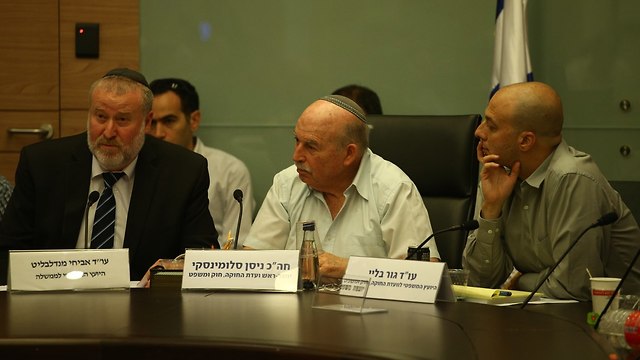
"Intensive investigations were held into Netanyahu's cases during 2017 and proceeded into the first months of 2018," Mandelblit explained.
"Four months ago the police gave its recommendations on Case 1000 (the Gifts Affair), and Case 2000 (the Netanyahu-Mozes Affair) and the investigations' materials have been transferred to the State Attorney's Office which has begun reviewing them," the Attorney General went on to say.
"A misconception exists about how things operate—recommendations don't necessarily mean an indictment has to be filed," he stated, stressing that "The main and only principle leading the State Attorney's Office is revealing the truth."
The Attorney General also said state's witnesses are an "important tool but noted that they cause delays in the investigations' procedures.
"I strongly reject the claims according to which the law reinforcement system has teamed up to persecute a certain figure. When a reasonable suspicion exists, an investigation should be launched," the attorney general elaborated.
"Any attempt to delegitimize the system of using state's witnesses is tantamount to an attempt to prevent discovering the truth," he argued.
"In Case 1000 we have testimonies about gifts being provided to the prime minister, and in Case 2000 we have recordings of private talks held between the Prime Minister and the and Yedioth Ahronoth publisher (Arnon) Mozes," Mandelblit said.
"However, those who think that this evidence constitute the entire case are mistaken," he sought to clarify.
"Those who know something about the law understand that (the aforementioned) evidence is indeed very important, but it doesn't conclude the investigation. On the contrary. That evidence serves to merely launch the investigations," Mandleblit said.
"Based on that evidence, the police investigators began reviewing all the facts about what exactly happened? What is the background (leading to the event)? What preceded what? What are the interests behind the suspects' conduct?" he specified.
Those questions, he said, were at the heart of the investigations, to which there are no easy answers. "However, accurate and elaborated answers must be provided. We are doing all we can to provide answers," he assured.
"Furthermore, the cases (in which the prime minister is involved) demonstrate the technological era in which we live."
"Cases 1000 and 2000 and particularly 4000 (the Bezeq Affair) have a lot of digital media. Going through the media requires special treatment and skills (since) it contains a large amount of material to listen to, classify, and transcribe," he continued, adding that the process was arduous and time-consuming but which had to be examined thoroughly.
"In Case 4000 state's witnesses gave testimonies on other cases which require more investigation," the attorney general said.
"For example, in Case 4000 we received recordings from a state's witness that were also relevant for the other cases. Therefore, we have to gather further evidence as we are currently doing," he explained.
"The cases are at a very advanced stage but we still have work to do. I ask to allow the police to do their job, and I advise those who say an indictment should be filed to wait," he implored his listeners.
"Suspects also have rights. Those who tweet won't prevent me from fulfilling my duty. I couldn't care less about them," he lashed out.
Mandelblit explained the inherent complications of a criminal investigation—let alone one that involves suspicions of integrity offences.
"A witness leads to another witness. Reviewing computer files leads to hundreds, maybe even thousands of documents, recordings, transcripts and they lead to more witnesses and so on," the attorney general explained.
"Moreover, the police chief commissioner as well the state's attorney have noted that the volume of materials collected both in Case 1000 and in Case 2000 is immense.
"(Reviewing the evidence) requires serious work, which does not depend on social media tweets. Revealing the truth is (our) highest value," he said with determination.
"Reaching results quickly is important but (a quality) investigation is significantly more important. I would like to explain the meaning of conducting an investigation accompanied by a team of attorneys supervised by the (legal) system's senior officials," Mandelblit said.
"The investigators collects testimonies, investigate suspicions, review documents—over the past few months investigators collected dozens of testimonies in Case 1000 as well as in Case 2000, some of them overseas. Police attempted to obtain every relevant piece of information," he said.
Mandelblit spoke at length about the role of the state's witnesses in the prime minister's investigations. "A state's witness agreement means providing benefits to a person suspected of committing an offense," he said.
"It's not a simple decision and it would have been preferable to exercise the full power of the law on suspects with existing evidence against them. Nevertheless, I reiterate, in order to get to the truth and on behalf of the public interest invested in these significant cases we are willing to pay the price," he explained.
"I'm aware of the attempt to delegitimize the system of using state's witnesses, and unfortunately they stem from irrelevant agendas, at times maybe even political agendas," he criticized.
"This is part of a wider campaign aimed at law enforcement authorities and the State's Attorney's Office on the backdrop of the case which are in process."
The attorney general committed to the decision of filing an indictment against the prime minister's wife Sara Netanyahu in the "residence affair," and to recent publications according to which talks were held to withhold the indictment in exchange for paying a fine.
"I don't know anything about talks or negotiations held in order to reach such an arrangement after the indictment had been submitted," the attorney general concluded.



















